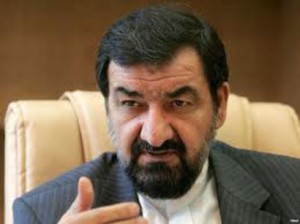 AFP -�With just 100 days to go until a presidential election in Iran, both conservative heavyweights and reformists weakened after the controversial 2009 poll are keeping their cards close to their chests.
AFP -�With just 100 days to go until a presidential election in Iran, both conservative heavyweights and reformists weakened after the controversial 2009 poll are keeping their cards close to their chests.The June 14 election will be followed closely in the West four years after Mahmoud Ahmadinejad's re-election for a second term sparked a wave of violent protests that were suppressed by the regime with deadly force.
Under the constitution, Ahmadinejad cannot stand for a third consecutive four-year term.
Mohsen Rezai, once commander of the elite Revolutionary Guard and now secretary of the Expediency Council, Iran's highest arbitration body, and ex-foreign minister Manouchehr Mottaki have expressed an interest in the post.
But both lack a popular support base and do not seem to have backing from within the regime, so their chances must be slim.
Rezai also stood as a candidate in 2009, but secured less than a million out of the 40 million votes cast.
And if Mottaki was well-known outside Iran, he has all but disappeared from the domestic political arena since his surprise dismissal by Ahmadinejad in 2010.
Without essential backing they may not even put their names forward on May 7, when the official registration of presidential contenders begins.
The process of screening candidates is entrusted to the Guardians Council, an unelected body controlled by religious conservatives appointed by supreme leader Ayatollah Ali Khamenei.
The council is set to announce the names of those who have been cleared to stand no later than May 22.
Given the microscopic scrutiny that contenders must undergo, Ahmadinejad's mentor Esfandiar Rahim Mashaie is unlikely to pass muster.
The former presidential chief of staff is the bane of ultra-conservatives because of his perceived "deviationist" nationalist and liberal views.
Ahmadinejad is therefore expected to resort to another like-minded person to back.
The ultra-conservatives supported Ahmadinejad in 2009, but declared open war against him after he challenged Khamenei's authority in spring 2011.
To find a suitable replacement, the conservative camp has been active behind the scenes.
Three potential successors have formed an alliance called the "tripartite principalists coalition."
Ali Akbar Velayati was foreign minister for 16 years from 1981 to 1997 and foreign affairs adviser to Khamenei, and the second is Mohammad Baqer Qalibaf, the current mayor of Tehran and a former national police chief.
The third, Gholam Ali Hadad-Adel, used to be a speaker of parliament, and his daughter is married to Khamenei's son.
Velayati, who is touted as the most serious candidate, has said that one of the trio will register as a candidate, but remained open on who it will be and when the name will be announced.
The conservative "persistence front," which though close to Ahmadinejad is anti-Rahim Mashaie, could field Saeed Jalili, Secretary of the Supreme National Security Council who is leading talks with world powers on Tehran's nuclear drive.
Parliament Speaker Ali Larijani, a member of an influential conservative and religious family whose brother heads the judiciary, is a direct appointee of Khamenei and another potential candidate.
It is unclear who will be fielded by the reformists, who want to turn the page on 2009 when their candidates Mir Hossein Mousavi and Mehdi Karroubi cried foul over suspected widespread fraud and spearheaded the post-poll protests.
Hundreds of thousands of people poured onto the streets after Ahmadinejad's re-election, and the authorities responded with a massive crackdown.
Mousavi and Karroubi, who both once held high-ranking posts in the Islamic republic, have been sidelined and kept under house arrest for more than two years.
The moderate-conservative former presidents Akbar Hashemi Rafsanjani and the reformist Mohammad Khatami will not stand in the election, according to their close relatives.
Mohammad Reza Aref, a vice president under Khatami, has announced his willingness to stand, while Hassan Rowhani, who was in charge of the nuclear talks with major powers under Khatami, has hinted he may also try his luck.
By France 24
The Iran Project is not responsible for the content of quoted articles.










